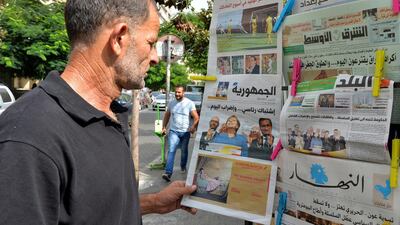The decision of Lebanon's Al Anwar newspaper last Friday to end publication of its print version was another sign of the deteriorating press environment in the country. This came after Al Hayat closed its Beirut offices earlier this year, and after the closure of Al Safir in 2016.
For a long time, Beirut hosted a relatively free press, as governments and political figures around the region helped to finance newspapers in the Lebanese capital to advance their own political agendas. Lebanon was a lively playing field for inter-Arab rivalries, and journalists were sometimes hired hands for governments or influential figures. This hardly made for ideal journalism, but it did make for a stimulating forum to follow what was going on in the region.
However, beyond journalism, the Al Anwar announcement was another reminder of how Beirut has failed to fulfil its post-civil-war ambitions. When the Lebanese war ended in 1990, the country could finally dream of rebirth after a 15-year conflict that had chased away successive generations of Lebanese. The purveyor of this anticipated renaissance was a Lebanese-Saudi businessman named Rafik Hariri, who became prime minister in 1992.
Hariri’s vision was not a particularly subtle one. He sought to recreate the mythical pre-civil-war Beirut, a city that had been a liberal business entrepot for the region, and to open Lebanon up to investment and development. Concrete was God under Hariri, and much of what had been attractive in Beirut was torn down in favour of towering blocks of luxury buildings. He also rebuilt vital infrastructure, which meant that the reconstruction was, for a time, seen as a success story.
In many ways, Hariri’s project was successful, although the corruption it fuelled reached astronomical levels. Lebanon’s economy today, two decades later, faces a serious threat of collapse. This can be attributed to the artificially high costs imposed on certain projects, so that Lebanese politicians and their Syrian sponsors could get kickbacks and cuts of the profits.
Alongside this cynical reality, however, existed an aspiration to revive Beirut as something more than a lucrative construction site. It would be a cosmopolitan playground for the region, but also a fount of innovative ideas in the Arab world, as it had been in the 1960s and 1970s. As the late journalist Samir Kassir said in an interview in 2004, Lebanon was “a laboratory for violence, but we were also, before that, a laboratory for modernity, and in some ways we still are”.
Post-civil-war Beirut was supposed to embody this revitalised aspiration to modernity. Unfortunately, Lebanon did not easily lend itself to such an effort –though there were surprising exceptions. Neither Hariri nor his ministers were sensitive to Beirut’s intellectual ambitions, but they did create spaces for others to pursue them. Ironically, in this regard, the Lebanese press was allowed to become a forum for Syrians critical of their government.
Most indicative of Hariri’s discomfort with ideas, however, was his dismissal of those who sought to create a memory of the war. For instance, a memorial created by the French-born American sculptor Arman, titled Hope for Peace, was initially supposed to be placed in Beirut’s rebuilt city centre. Instead, it was banished by Hariri to the Lebanese Ministry of Defense on the outskirts of the capital. Hariri’s idea of Beirut was that of a marketplace for the region, and he was not someone who dwelled on the past.
Unfortunately, a marketplace is what the city became, not for businessmen, but for political foes. Under Syrian rule, Lebanon opened its doors to Iran. As a result, Hariri was compelled to grant Hezbollah the freedom to pursue its fight against Israel. This allowed the party to build its arsenal and develop into the military force it is today. But, since stability in post-war Lebanon was also the fruit of a compromise between Syria and Saudi Arabia – the latter of which was Hariri's patron – the country was inoculated against regional disagreements for more than a decade.
That is, until Hariri threatened the status quo when he sought to participate in the parliamentary elections of 2005 and challenge Syria's hegemony over Lebanon. His assassination in February of that year was designed to stifle such an aim, but it also led to the withdrawal of Syrian forces from Lebanon under popular pressure.
With Hariri gone, his guiding principles for post-civil-war Lebanon came crashing down. Instead of striving to make Beirut an outpost of liberalism, development, and modernity, those leading the country transformed it into a frontline for regional enmities. This led to a period of sustained volatility, Hezbollah’s imposed supremacy over a majority of Lebanese people who do not subscribe to its agenda, and Lebanon’s increasing isolation from the Arab world.
The crisis of the Lebanese press is one small illustration of this. With the country no longer regarded as an important and influential presence in the region, few Arab governments have seen any need to continue to shape opinion there. Previously Hariri’s vanguard city, Beirut has found itself on the Middle East’s margins – interesting but irrelevant. Today, its inhabitants feel vulnerable as they await the next cataclysm, and console themselves by recalling a distant past that tells them a better story.
Michael Young is editor of Diwan, the blog of the Carnegie Middle East programme, in Beirut


